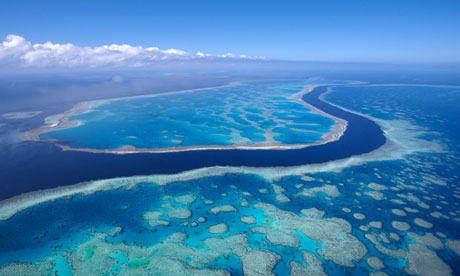Australia's Great Barrier Reef is in trouble according to the country's government.

It says the conditions are 'poor' and that extreme events in recent years, such as cyclones and flooding, and the effects of climate change are to blame.
Scientists also say chemicals, used in farming, which find their way into the water have also had a big impact.
Poor water quality is bad news for the fish and sea creatures that live in this the world's largest coral reef.
But wildlife charity WWF say the reef can get back on the right track if the Australian government does more.
"Solutions do exist," said WWF's Nick Heath, "...we just need more investment, more targeted action in the most dangerous pollution hotspots."
The Australian government has already tried to improve conditions in the reef, but hasn't achieved as much as it had wanted to.
The 2013 scientific consensus statement, released at the same time as the report card, concluded that coral cover of inshore reefs had declined by 34% since 2005. ( From CBBC News)

Extreme weather conditions have been largely blamed for the Great Barrier Reef's poor health in 2011. Photograph: Grant V. Faint/Getty Images
The new environment minister Mark Butler said: "In spite of solid improvement, data tells us that poor water quality is continuing to have a detrimental effect on reef health.
"To secure the resilience of the Great Barrier Reef it is critical that we build on the momentum of the previous reef plan with a focus on improving water quality and land management practices through ambitious but achievable targets."
The federal and Queensland state environment ministers announced that they would invest a total of $375 million between 2013 and 2018 under a new Reef Water Quality Protection Plan, designed "to guide initiatives to ensure that runoff from agriculture has no detrimental impact on the health and resilience of the Great Barrier Reef".
The Queensland minister for environment, Andrew Powell, praised those landholders in the region who were improving their practise. "We are working closely with industry, landholders, natural resource management bodies and community groups to accelerate the uptake of practices that maximise reef water quality while maintaining and enhancing profitability and environmental performance," he said.
But Greenpeace spokeswoman Georgina Woods was critical of the bi-annual meeting between the two ministers. She said neither minister had engaged with the key issue of coal export and mining within the region, particularly at a controversial new dredging proposal at the Abbot Point coal terminal.
"One day after the new environment and climate change minister deferred a crucial decision on the future of Abbot Point, the Great Barrier Reef Ministerial Forum has failed to tackle the problems that every Australian knows are eating away at the Great Barrier Reef: global warming and ocean acidification. Hopefully, today's missed opportunity is just a dress rehearsal for the main event in August, when the new minister will be called upon to choose between safeguarding the Great Barrier Reef and letting the coal industry dredge, dump and develop Abbot Point.
"It is pretty clear that the Queensland government is not going to stand up to the coal industry and protect the reef in the interests of the broader community and future generations. Mark Butler now has 30 ays to make a decision about Abbot Point. To safeguard the Reef and fulfill his climate change brief, he has no choice: he must say 'no' to the coal industry," Woods added. (From the guardian)
No comments :
Post a Comment